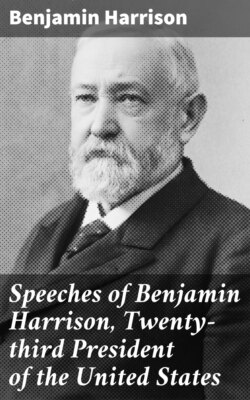Читать книгу Speeches of Benjamin Harrison, Twenty-third President of the United States - Benjamin Harrison - Страница 26
На сайте Литреса книга снята с продажи.
INDIANAPOLIS, AUGUST 3.
ОглавлениеTable of Contents
On the third of August, with the mercury registering ninety-nine degrees, thirty-five hundred visitors arrived from Montgomery and Clinton counties, Indiana. Their parade, carrying miniature log-cabins and other emblems, was one of the most enthusiastic demonstrations of the campaign. Fifty voters of 1840 headed the column led by Major D. K. Price, aged 92. The Montgomery County delegation was marshalled by John H. Burford, W. W. Thornton, T. H. B. McCain, John S. Brown, E. P. McClarkey, John Johnson, J. R. Bonnell, D. W. Roundtree, T. H. Ristine, H. M. Billingsley, Dumont Kennedy, and Clerk Hulett of Crawfordsville. Their spokesman was Hon. Peter S. Kennedy.
Among the Clinton County leaders were Albert H. Coble, Edward R. Burns, A. T. Dennis, Wm. H. Staley, R. P. Shanklin, S. A. Coulton, J. W. Harrison, J. T. Hockman, Nicholas Rice, Ambrose Colby, Oliver Hedgecock, and Dr. Gard of Frankfort. Judge J. C. Suit was their orator.
In reply to their addresses General Harrison said:
My Fellow-citizens—These daily and increasing delegations coming to witness their interest in the great issues which are presented for their consideration and determination, and bearing as they do to me their kind personal greetings, quite overmatch my ability to fittingly greet and respond to them.
You are here from every walk in life. Some of you have achieved success in the mechanical arts, some in professional pursuits, and more of you come from that first great pursuit of man—the tilling of the soil—and you come to express the thought that you have common interests; that these diverse pursuits are bound together harmoniously in a common governmental policy and administration. Your interests have had a harmonious and an amazing growth under that protective system to which your representatives have referred, and you wisely demand a continuation of that policy for their further advancement and development. [Applause.] You are in large part members of the Republican party. You have in the past contributed your personal influence, as well as your ballots, to the great victories which it has won. Among the great achievements of our party I think we may worthily mention the passage of that beneficent act of legislation known as the "homestead law." It was impossible to the old parties. It was possible only to a party composed of the sturdy yeomanry of the free States. [Applause.] It has populated our Territories and newer States with the elect of our citizenship. It opened a way to an ownership of the soil to a vast number of our citizens, and there is no surer bond in the direction of good citizenship than that our people should have property in the soil upon which they live. It is one of the best elements of our strength as a State that our farm-lands are so largely possessed in small tracts, and are tilled by the men who own them. It is one of the best evidences of the prosperity of our cities that so large a proportion of the men who work are covered by their own roof trees. If we would perpetuate this condition, we must maintain the American scale of wages. [Applause.] The policy of the subdivision of the soil is one that tends to strengthen our national life. God grant that it may be long before we have in this country a tenantry that is hopelessly such from one generation to another. [Applause.] That condition of things which makes Ireland a land of tenants, and which holds in vast estates the lands of England, must never find footing here. [Applause.] Small farms invite the church and the school-house into the neighborhood. Therefore, it was in the beginning the Republican party declared for free homes of a quarter-section each. That policy should be perpetuated as long as our public domain lasts, and all our legislation should tend in the direction which I have indicated. I cannot discuss all the important questions to which you have called my attention. I have before alluded to some of them. My Montgomery and Clinton county friends, I thank you for the cordial and hopeful words you have addressed to me. My highest ambition is to be found worthy of your respect and confidence. [Applause.]
To these veterans of 1840 who kindly transfer to this the interest they felt in that campaign, to these first voters who come to join us with the high impulses of youth, I desire to extend my sincere thanks. [Applause.]
